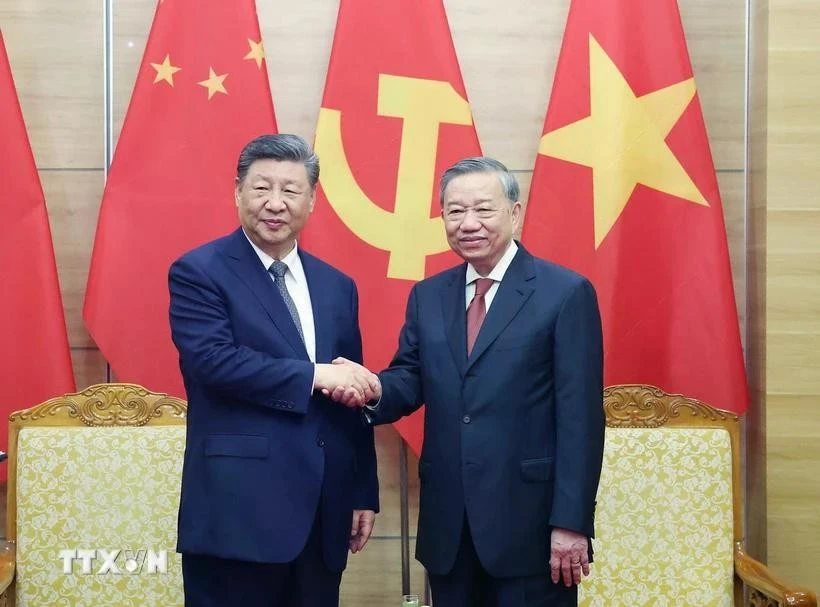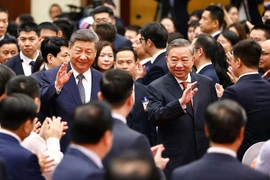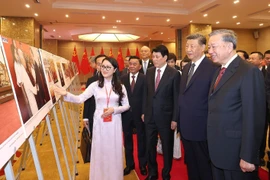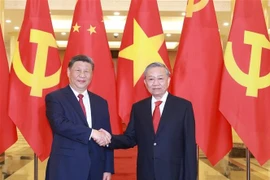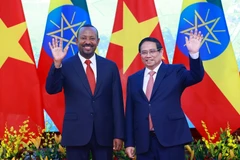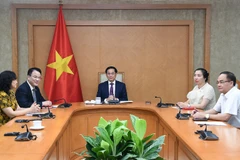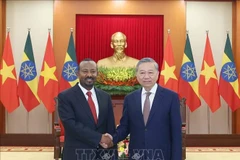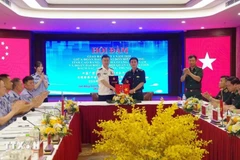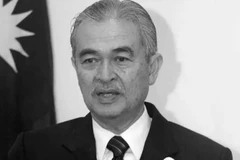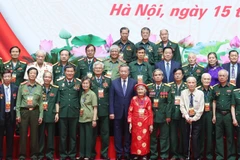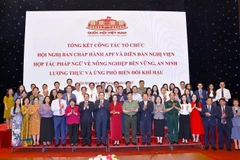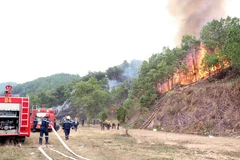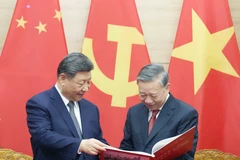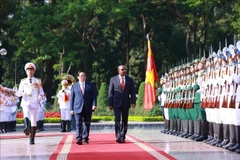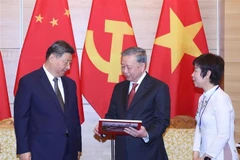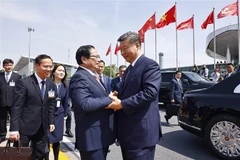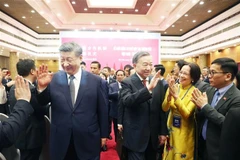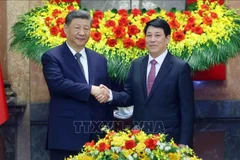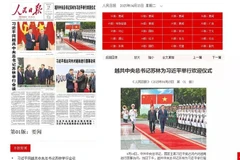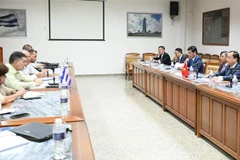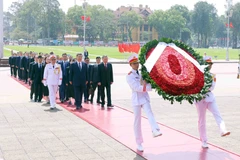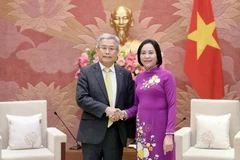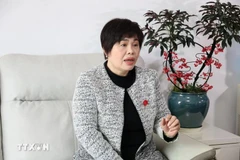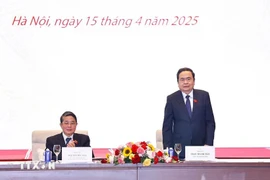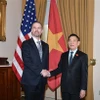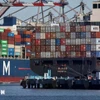Hanoi (VNA) - Vietnam and China have issued a joint statement on continuing to deepen the Comprehensive Strategic Cooperative Partnership and promoting the building of a Vietnam - China community with a shared future that carries strategic significance, on the occasion of the state visit to Vietnam by General Secretary of the Communist Party of China (CPC) Central Committee and President of China Xi Jinping from April 14-15.
The following is a translation of the joint statement.
JOINT STATEMENT BETWEEN THE SOCIALIST REPUBLIC OF VIETNAM AND THE PEOPLE'S REPUBLIC OF CHINA ON CONTINUING TO DEEPEN THE COMPREHENSIVE STRATEGIC COOPERATIVE PARTNERSHIP AND PROMOTING THE BUILDING OF THE VIETNAM-CHINA COMMUNITY WITH SHARED FUTURE THAT CARRIES STRATEGIC SIGNIFICANCE
1. At the invitations of General Secretary of the Central Committee of the Communist Party of Vietnam To Lam and President of the Socialist Republic of Vietnam Luong Cuong, General Secretary of the Central Committee of the Communist Party of China and President of the People's Republic of China Xi Jinping paid a state visit to Vietnam from April 14 to 15, 2025.
During the visit, Party General Secretary and President Xi Jinping held talks with Party General Secretary To Lam and State President Luong Cuong and met with Prime Minister Pham Minh Chinh and National Assembly Chairman Tran Thanh Man.
In an atmosphere of sincerity and friendship, the two sides informed each other about the situation of each Party and country, exchanged in-depth opinions and reached important common perceptions on continuing to deepen the Comprehensive Strategic Cooperative Partnership, promoting the building of a Vietnam-China community with a shared future that carries strategic significance, discussed international and regional issues of shared concern.
2. The two sides agreed to steadfastly promote the Vietnam-China friendship.
The two sides held that Vietnam and China are geographically adjacent, culturally close, and have close people-to-people ties, similar regimes, and interrelated destinies. They are good neighbours, good friends, good comrades, and good partners. They are both socialist countries led by the Communist Parties, and both strive for the happiness of the people and the prosperity of their country, as well as for the noble cause of peace and progress of humanity. The two sides looked back at the development of the relationship between the two Parties and countries since the establishment of diplomatic relations 75 years ago. Vietnam was the first country in Southeast Asia to establish diplomatic relations with the People's Republic of China, while China was the first country in the world to recognise and establish diplomatic relations with the Democratic Republic of Vietnam, now the Socialist Republic of Vietnam. No matter how the world situation changes, the two sides have always fought side by side, supported each other in the struggles for national independence and liberation, learned from each other, and together moved forward to seek a socialist path suitable to the situation of each country and modernisation bearing the characteristics of each country. The Party, State and people of Vietnam always appreciate and cherish the strong support of the Party, State and people of China. The two sides shared the view that the traditional friendship - “the profound Vietnam-China relationship, both comrades and brothers” - built and nurtured by President Ho Chi Minh, Chairman Mao Zedong and leaders of previous generations, is increasingly strong. It is a valuable asset shared by two countries’ people, and needs to be well inherited, protected and promoted.
Entering a new era, with the strategic orientations of Party General Secretary Nguyen Phu Trong and Party General Secretary To Lam, and Party General Secretary and President Xi Jinping together with the leaders of the two Parties and countries, the Vietnam - China relationship has developed remarkably, especially since the declaration of the building of the Vietnam-China community with a shared future that carries strategic significance in December 2023. Up to now, the Vietnam - China relationship has entered a new stage with: higher political trust, more substantive defence - security cooperation, deeper and substantive cooperation, more solid social foundation, closer multilateral coordination, better controlled and resolved differences; comprehensive strategic cooperation has achieved many great results, bringing practical benefits to the people of the two countries.
Given the changes of the world, the times, and history, China emphasised that it consistently pursues the policy of friendship with Vietnam, always considering Vietnam a priority in its neighbourhood diplomacy. Vietnam reaffirmed that it always considers relations with China a consistent policy, an objective requirement, and a top priority in its foreign policy of independence, self-reliance, multilateralisation, and diversification. This is the strategic choice of both sides.
The two sides agreed that it is necessary to firmly support each other in maintaining strategic autonomy and autonomously choosing a development path suitable to the situation of their countries; persistently following the political orientations of the top leaders of the two Parties and countries, considering the development of the other side as an opportunity for their own development, persistently perceiving and developing the Vietnam-China relationship from a strategic height and long-term vision, persistently following the motto of "friendly neighbourliness, comprehensive cooperation, long-term stability, looking towards the future", the spirit of "good neighbours, good friends, good comrades, good partners" and "six major orientations". They will take the occasion of the 75th anniversary of the diplomatic relations as an opportunity to continue to deepen the Comprehensive Strategic Cooperative Partnership, promote the building of the Vietnam-China community with a shared future that carries strategic significance, enhance mutually beneficial cooperation between the two sides with higher quality, deepen strategic coordination, bring more practical benefits to the people of the two countries, make important contributions to the stable development of the region and the cause of peace and progress of humanity, and create a positive model for building a community with a shared future of humanity.
3. The two sides reaffirmed the need to firmly support each other on the path to socialism in accordance with each country's situation
The Vietnamese side warmly congratulated China on successfully holding the “Two Sessions” [the sessions of the sessions of the National People's Congress and the National Committee of the Chinese People's Political Consultative Conference], and on its historic achievements and historic changes in its socio-economic development. Vietnam supported China in comprehensively promoting the national rejuvenation process through Chinese-style modernisation, and held that China's continued comprehensive reform, opening-up, and high-quality development would bring new opportunities for the modernisation process of developing countries, including Vietnam.
The Vietnamese side wished and believed that, under the steadfast leadership of the Communist Party of China Central Committee with Xi Jinping as the core, and the guide of Xi Jinping Thought on Socialism with Chinese Characteristics for a New Era, the Party, Government and people of China will certainly complete the goals and tasks of the 14th five-year plan with high quality, comprehensively build a modern socialist power, and successfully realise the second centenary goal.
The Chinese side warmly congratulated Vietnam on the 95th anniversary of the founding of the Communist Party of Vietnam, the 80th anniversary of the founding of the Socialist Republic of Vietnam. It highly valued the country’s important achievements in nearly 40 years of doi moi (renewal), nearly 15 years of implementing the "Platform for national construction in the period of transition to socialism" (supplemented and developed in 2011). Vietnam has promoted high economic growth, significantly improved people’s life, deeply integrated into global politics, the world economy and human civilisation, undertaken many important international responsibilities, and played an increasingly active role in international organisations and multilateral forums. The Chinese side wished and believed that under the strong leadership of the Communist Party of Vietnam Central Committee headed by General Secretary To Lam, the Party, State and people of Vietnam will certainly successfully implement the goals and tasks set by the 13th National Party Congress, prepare well and successfully organise the 14th National Party Congress in 2026, bring the country into a new era of development, successfully build a socialist Vietnam with rich people, strong country, democracy, equality and civilisation. China reaffirmed its support for Vietnam's efforts for prosperous development, the happiness of its people, a strong, independent, and self-reliant economy, comprehensive promotion of reform, industrialisation, modernisation, international integration, the expansion of its foreign relations, and its enhanced role for peace, stability, development, and prosperity in the region and the world.
4. The two sides determined that it is necessary to work together to raise strategic trust to a higher level
The two sides reaffirmed that high-level orientations, especially strategic ones of the top leaders of the two Parties and countries, play an irreplaceable and important role in the stable and healthy development of Vietnam-China relations. They agreed to continue strengthening high-level exchanges between the two Parties and countries through various forms such as mutual visits, sending special envoys, maintaining hotlines, and letter exchanges. They emphasised the importance of timely communications on bilateral relations between the two Parties and States, major and important issues of mutual concern, as well as the current international and regional situation, in order to firmly grasp the correct direction for the development of Vietnam–China ties.
Both sides also agreed to continue to fully promote the special role of the Party channel, further strengthen the role of the exchange and cooperation mechanism between the two Parties, especially high-level meetings and theoretical seminars between the two Parties; improve the effectiveness of exchange and cooperation between the respective agencies of the two Parties at the central level, local party organisations of the two countries, especially the border provinces (regions). Through theoretical seminars, and cooperation in personnel training, and delegation exchanges via the Party channel, both sides will comprehensively implement exchanges of theory and practical experiences in Party building and national governance, and work together to deepen mutual understanding of the Party’s leadership role, advance the socialist cause in the context of unprecedented changes in the world, thus contributing to Party building and the development of socialism in both countries.
The two sides will further strengthen friendly exchanges and cooperation between the National Assembly of Vietnam and the National People's Congress of China, the Vietnamese Government and the Chinese Government, the Vietnam Fatherland Front and the Chinese People's Political Consultative Conference. They will well organise the meeting of the Inter-Parliamentary Cooperation Committee between the National Assembly of Vietnam and the Chinese People's Congress, friendly exchanges between the Vietnam Fatherland Front Central Committee and the Chinese People's Political Consultative Conference and the VFF and CPPCC organisations of border provinces.
Promoting the coordinating role of the Vietnam-China Bilateral Cooperation Steering Committee, direct the two countries’ ministries, sectors and localities to promote the building of the Vietnam-China Community with a shared future; and deepen political security cooperation, establish the "3+3" strategic dialogue mechanism on diplomacy, defense and public security between Vietnam and China at the ministerial level and organise the first ministerial-level conference at an appropriate time.
Continuing to effectively implement the Agreement on further deepening cooperation in the new situation between the two countries' foreign ministries; maintain regular contacts between leaders of the two foreign ministries, including the Strategic Consultation at the Permanent Deputy Minister level, annual diplomatic consultation, enhance exchanges at the department (office) level, effectively implement the personnel training plan, and facilitate the improvement of headquarters and housing conditions of the two countries' diplomatic missions; and support the Vietnamese Consulate General in Chongqing to officially come into operation in the first half of 2025.
The Vietnamese side affirmed its adherence to the “one China” policy, recognising that there is only one China in the world, that the Government of the People’s Republic of China is the sole legitimate government representing all of China, and that Taiwan is an inseparable part of Chinese territory. It supported the peaceful development of cross-strait relations and the cause of China’s unification, resolutely opposes any separatist activity seeking “Taiwan independence”, and consistently backed the principle of non-interference in the internal affairs of other countries. The Vietnamese side does not develop any state-level relations with Taiwan. The Vietnamese side held that the issues of Hong Kong, Xinjiang, and Tibet are China’s internal affairs, and supported China in maintaining the stable development of Hong Kong, Xinjiang, and Tibet. The Chinese side expressed its appreciation for these stances of Vietnam and expressed its support for Vietnam in maintaining social stability, ensuring national security, development, and national unity.
5. The two sides reaffirmed the need to build a more substantive pillar of national defence-security cooperation
National defence-security cooperation is one of the pillars of the Vietnam-China relationship, contributing significantly to consolidating strategic trust between the two Parties and the two countries. The two sides agreed to strengthen cooperation mechanisms on national defence, public security, security, the Supreme Court, the Supreme Procuracy, enhance exchanges between the respective judicial agencies of the two countries, and promote the following key cooperation:
The two sides vowed to increase high-level and all-level exchanges between their armies; uphold the role of mechanisms such as the Border Defence Friendship Exchange and the Defence Strategic Dialogue; bolster exchanges and cooperation between armies in areas such as political work, personnel training, strategic research, and joint research; strengthen cooperation in defence industry, joint exercises and training, and mutual naval ship visits; continue to expand cooperation in areas such as medical logistics, UN peacekeeping and non-traditional security; deepen border cooperation, strengthen coordination in border management, deploy joint border patrols on land, encourage border guards of the two countries to establish frienships, and enhance friendly exchanges in border areas; uphold the role of the joint patrol mechanism in the Gulf of Tonkin, effectively deploy joint patrol activities in the Gulf of Tonkin, deepen the exchange and cooperation mechanism between the navies and coast guards of the two countries.
They pledged to increase high-level exchanges between law enforcement agencies; uphold the role of the mechanisms of the Ministerial Conference on Crime Prevention, the Deputy Ministerial Strategic Security Dialogue, the Deputy Ministerial Dialogue on Political Security; effectively deploy cooperation in the fields of security, intelligence, counter-terrorism, and accelerate the opening of a hotline between the two Ministers of Public Security; coordinate the prevention of cross-border crimes; deepen cooperation between the Vietnamese Ministry of Public Security and Chinese security and law enforcement agencies, enhance cooperation in counter-terrorism, prevention of telecommunications fraud, cyber security, economic crimes and human trafficking, immigration management, and arrest of criminals who have fled abroad; strengthen information exchange and experience sharing in counter-intervention, counter-separatism, and prevention of “colour revolution” and “peaceful evolution” by hostile forces; expand cooperation between the Vietnamese Ministry of Public Security and the Chinese Ministry of Emergency Management; strengthen cooperation in the legal and judicial fields, effectively implement the Memorandum of Understanding on cooperation between the Vietnamese Ministry of Public Security and the Chinese Ministry of Justice and between the Ministries of Justice of the two countries; organise the first conference between judicial administrative agencies of the provinces sharing the border this year, continuously improve the judicial support mechanism, and enhance learning and exchange of experience in building a socialist rule-of-law state.
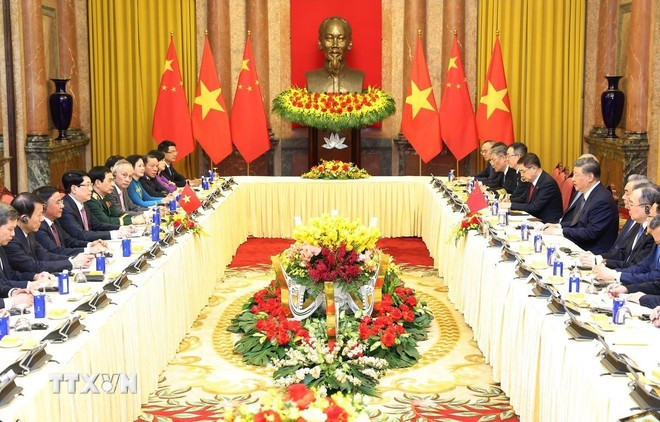
6. The two sides agreed to consider China's development of new quality productive forces and Vietnam's development of new production forces as opportunities to build a more comprehensive and extensive cooperation structure.
They will accelerate the connection of development strategies between the two countries, effectively implement the Cooperation Plan connecting the "Two Corridors, One Belt" Framework with the "Belt and Road" Initiative; prioritise accelerating infrastructure connection in terms of railway, expressway, and border gate infrastructure.
Both sides will promote the role of the Vietnam-China Joint Committee on Railway Cooperation, effectively implement the Agreement between the Government of Vietnam and the Government of China on cooperation in implementing standard gauge railway projects connecting Vietnam and China, and step up standard gauge railway connections across the border. China is willing to work with Vietnam to study and deploy cooperation in technology and human resource training. The two sides appreciated China's approval of the Technical Assistance (TA) to launch a Feasibility Study (F/S) for the Lao Cai - Hanoi - Hai Phong standard gauge railway and agreed to soon implement the F/S, strive to start construction soon; accelerate the study of a plan for a railway section connecting Lao Cai - Ha Khau, creating a basis for early implementation of the plan. They welcomed the signing of the Official Letter of Assistance to establish the planning of the two standard gauge railways Dong Dang - Hanoi and Mong Cai - Ha Long - Hai Phong.
They promised to reinforce cooperation in road construction techniques; appreciated the commencement of construction of the road bridge across the Red River in the Bat Xat (Vietnam) - Ba Sai (China) area, accelerate the construction of cross-border traffic works at the Thanh Thuy (Vietnam) - Tianbao (China) international border gate. They will continue to uphold the role of the Vietnam-China Land Border Gate Management Cooperation Committee, hasten the construction of smart border gates at customs clearance points and dedicated routes for transporting goods in the areas of markers 1088/2 - 1089 and markers 119 - 1120 of the Huu Nghi (Vietnam) - Youyi Guan (China) international border gate, consider expanding this model to other eligible border gates, including Mong Cai – Dongxing border gate, upgrade "soft connectivity" on smart customs; support the increased cooperation in road, air and railway transport; continue the amendment of the Border Railway Agreement, develop Vietnam-China international railway transport, restore international passenger transport, open more cross-border railway transport routes between Vietnam and China; facilitate inspection, quarantine and export-import of goods at railway border gates. On the basis of compliance with the rules governing take-off and landing times, they will create conditions for the extension and addition of take-off and landing times for airlines to exploit each other's markets, and encourage airlines to restore and open more flights according to market demand. The two sides welcome Vietnamese aviation companies to put Chinese commercial aircraft into operation in various forms, and support the further strengthening of cooperation in the field of commercial aircraft manufactured in China.
Strengthening strategic connections between their economies, linking regional development strategies including the Guangdong – Hong Kong – Macao Greater Bay Area and the Yangtze River Delta region, and extending the economic corridor in the "Two Corridors, One Belt" region to Chongqing. The two sides encourage and support capable and prestigious companies with advanced technology to invest in each other's countries, create a fair and favourable business environment for enterprises. Welcoming the cooperation between the two countries' enterprises in researching and applying 5G technology. Enhancing collaboration in emerging fields such as artificial intelligence, clean energy, green development, and digital economy. Promoting the role of the working group on studying the development of a Vietnam – China cross-border economic cooperation zone model while actively considering the pilot implementation of a cross-border economic cooperation model and jointly building safe and stable industrial and supply chains. Both sides agreed to deepen experience exchanges on state-owned enterprise reform and management, and carry out cooperation in human resources training. Promoting the efficacy of the working group on financial – monetary cooperation between the two countries, increasing information and experience sharing on policy administration and reforms in the financial – monetary area, properly implementing bilateral retail payment cooperation through QR codes, considering the expansion of payments in local currencies, as well as improving financial risk prevention capabilities. Considering cooperation in the field of key minerals in accordance with each country's legal regulations and industrial policies. Accelerating the implementation of the Vietnam Traditional Medicine Academy – Campus 2 project, the maintenance of the Vietnam – China Friendship Palace, and other public welfare cooperation projects.
The two sides concurred in leveraging the Regional Comprehensive Economic Partnership (RCEP) and the ASEAN – China Free Trade Area (ACFTA) to develop bilateral trade in a balanced manner. Bringing into play the role of the Trade Facilitation Working Group and the E-commerce Cooperation Working Group, continuing to tap into bilateral trade potential, and promoting e-commerce cooperation between enterprises of the two countries; and through dialogue and consultation, resolving trade-related differences and further expanding the space for cooperation between the two sides' businesses.
The two sides welcomed the signing of protocols for Vietnamese exports to China such as chili, passion fruit, raw and cleaned bird's nests, and rice bran. China is actively handling procedures for officially licensing Vietnamese agricultural products, including citrus fruits and plant-based medicinal materials. The Vietnamese side will accelerate the import of sturgeon from China. The two sides are unanimous in strengthening customs cooperation, expanding the export of products of their strength, and properly implement the mutual recognition plan for "Authorised Economic Operator" (AEO) and the "single window" cooperation. The Chinese side welcomed Vietnam's organisation of trade promotion activities and the advertising of Vietnamese goods brands in China, and is ready to facilitate the early establishment of additional Vietnamese trade promotion offices in Haikou (Hainan) and other relevant localities. The two sides agreed to coordinate to improve customs clearance efficiency at border gates, crossings, and pairs of border markets to reduce customs clearance pressure.
Continuing to promote the role of the Vietnam – China Joint Committee on Agricultural Cooperation and the Joint Committee on Fishery in the Gulf of Tonkin, promoting substantive cooperation in areas such as high-tech agriculture, including crop cultivation and intensive processing of agricultural products, food security, and comprehensive disease control. The two sides agreed to soon discuss and sign an agreement on fishery cooperation in the Gulf of Tonkin and implement cooperation in the release and protection of aquatic resources in the Gulf of Tonkin. Properly implementing the agreement on establishing a hotline to deal with unexpected fishery incidents in the Vietnam – China waters and the agreement on maritime search and rescue cooperation.
Enhancing cooperation in dealing with environmental pollution, especially air pollution in urban areas; enhancing cooperation in disaster prevention, control and mitigation, climate change response, water resources and meteorology, exchanging hydrological information in the flood seasons, while strengthening cooperation in comprehensive water resources management. Striving to make science and technology cooperation a new highlight in the bilateral relations, considering to carry out cooperation in fields such as AI, semiconductor, and nuclear energy. Properly implementing the Vietnam – China agreement on scientific and technical cooperation, continuing to leverage the role of the Joint Committee on Scientific and Technological Cooperation, deepening policy connections on science, technology and innovation, and launching joint research on health care, pharmaceutical, disaster prevention, control and mitigation, clean energy, and green agriculture. Bolstering cooperation in technological human resources, and promoting collaboration in technology transfer and innovative entrepreneurship. Encouraging cooperation projects on technology research and development, and human resources exchanges between research institutions and enterprises of the two sides. Stepping up collaboration in nuclear safety regulatory management and standardisation; considering cooperation in nuclear power development, continuing to effectively implement the agreement on intellectual property cooperation, and considering the cooperation in studying the possibility of mutual protection of geographical indications. Continuing to promote exchanges and cooperation in health care, health management, infectious disease prevention and control, and traditional medicine.
7. The two sides need to work together to consolidate the social foundation of the Vietnam – China community with a shared future
The two sides reaffirmed the necessity to view the 75th anniversary of the diplomatic relations and the Year of Vietnam – China Humanistic Exchange 2025 as an opportunity to properly hold people-binding, heartfelt, and practical humanistic exchange activities to help strengthen the social foundation. Fully utilising the "red resource" in exchanges between the two Parties. China invited the Vietnamese youth to China to implement the "red journey youth: research and study” programme to enhance mutual understanding and friendship between the two peoples, especially the two countries' younger generations.
The two sides emphasised that communications agencies of both Parties should bolster communications and education about the traditional friendship between the two Parties and the two countries, along with the Vietnam – China comprehensive strategic cooperation. Enhancing cooperation between press, media, publication, and broadcasting agencies. The two sides agreed to effectively implement the memorandum of understanding between the two countries' regulatory authorities on digital communications, and continuing to promote cooperation in the translation and distribution of outstanding audiovisual works from the two countries. Promoting the implementation of the project on translating the classical works of Vietnam and China.
Supporting the two countries' localities, especially border provinces, in conducting exchanges and cooperation, and highly valuing the achievements of mechanisms such as the spring meeting between the Party Secretaries of Quang Ninh, Lang Son, Cao Bang, Ha Giang provinces and the Party Secretary of Guangxi, and the annual conference between the Party Secretaries of Lao Cai, Ha Giang, Dien Bien, and Lai Chau provinces and the Party Secretary of Yunnan. Increasing exchanges between mass organisations such as labour unions, women's unions, youth organisations, as well as between the localities having friendly relations with each other. Continuing to well organise established activities such as the Vietnam – China Youth Friendship Meeting, the Vietnam – China People's Forum, and the Border People's Festival.
The two sides will practically implement the implementation plan for cultural – tourism cooperation for 2023–2027 between the cultural and tourism authorities of the two countries, and encourage cultural organisations and art troupes from the two countries to engage in exchanges and cooperation. Vietnam supports the Hanoi-based China Cultural Centre in carrying out activities. China welcomes Vietnam's coming establishment of a Cultural Centre in Beijing. Increasing information sharing and the coordination of tourism policies between the two countries, jointly operating tourism routes, building tourism products, and promoting the healthy development of the tourism industry. Efficiently operating the Ban Gioc (Vietnam) –Detian (China) waterfalls landscape site, and encouraging tourists from one side to travel to the other.
The two sides agree to properly carry out the Vietnam – China education cooperation agreement, and boost exchanges between teachers, students, and scholars. China welcomes and encourages more outstanding Vietnamese students to study and do research in China while being ready to continue providing more scholarships on courses in China. Deepening cooperation in vocational training; promoting language education and exchanges between the two countries, jointly providing training for Vietnamese teachers of Chinese language, effectively implementing the scholarships on the international Chinese language teacher programme that China provides for Vietnam; and actively bringing into play the role of the Confucius Institute at Hanoi University and the "Chinese Bridge" competition, thus intensifying educational cooperation. Bolstering exchanges between universities, colleges, and research institutions of the two countries.
8. The two sides agreed to forge closer multilateral strategy coordination
The two sides affirmed to strengthen multilateral coordination and cooperation in line with the process of building a Vietnam – China Community with a shared future that carries strategic significance. This year marks the 80th founding anniversary of the United Nations. The two sides reaffirmed the perseverance to defend the international system with the United Nations as its core, the international order with international law as its foundation, and the adherence to the “Five Principles of Peaceful Coexistence” and the basic norms of international relations with the purpose and principles of the United Nations Charter as the cornerstone. Vietnam congratulated China on the successful commemoration of the 70th anniversary of the proclamation of the “Five Principles of Peaceful Coexistence”. Facing the uncertainty, instability and unpredictability of the international situation, the two sides will firmly uphold multilateralism, jointly safeguard international fairness and justice and the common interests of developing countries; maintain solidarity and cooperation in the international community, promote the common values of humanity on peace, development, fairness, justice, democracy and freedom; support an equal and orderly multipolar world and the globalisation of inclusive economy, bringing about common benefits and developing global governance in a more equitable and reasonable direction. The two sides emphasised the joint opposition to hegemony and power politics, to unilateralism in all forms, and to actions that jeopardise regional peace and stability.
The two sides agreed to promote appropriate cooperation within the framework of major perspectives and initiatives such as building a Community with a Shared Future for Mankind, the Global Development Initiative, the Global Security Initiative and the Global Civilisation Initiative, and jointly respond to global challenges. The two sides are willing to jointly implement cooperation within the framework of the Global Civilisation Initiative, jointly promote cultural exchanges, and strengthen emotional connections between people of the two sides. Actively implementing the memorandum of understanding between the two countries on enhancing cooperation in human resources development within the framework of the Global Development Initiative. Effectively implementing cooperation documents to promote the Global Development Initiative and the high-quality Belt and Road connectivity. Supporting connectivity between China and the countries in the Mekong sub-region.
Strengthening coordination and cooperation within the framework of multilateral mechanisms such as the United Nations, the Asia-Pacific Economic Cooperation Forum (APEC), the Asia-Europe Meeting (ASEM), the Association of Southeast Asian Nations (ASEAN), and supporting each other in running for positions in international organisations. Vietnam highly values the important role of the BRICS in promoting solidarity and cooperation among emerging economies, is ready for discussion about becoming a partner country of BRICS, and is willing to strengthen cooperation with the Shanghai Cooperation Organisation.
The two sides paid attention to the trade and investment restrictions and reaffirmed the commitment to maintaining an open, transparent, inclusive, and non-discriminatory multilateral trading system, with the World Trade Organisation (WTO) at its core and rules-based governance as the foundation, and to promoting economic globalisation to develop in an open and inclusive direction that brings about common, balanced, and win-win benefits.
The two sides will work together to well implement the "Initiative on International Trade and Economic Cooperation Framework for Digital Economy and Green Development"; promote the high-quality implementation of the Regional Comprehensive Economic Partnership (RCEP); actively welcome the application of the Hong Kong Special Administrative Region (China) to join the RCEP. The Vietnamese side supports China's accession to the Comprehensive and Progressive Agreement for Trans-Pacific Partnership (CPTPP) in accordance with the standards and procedures of the Agreement. The two sides underscored the importance of cooperation in combating cybercrime, welcomed the adoption of the "United Nations Convention on Cybercrime" by the United Nations General Assembly, and called on countries to actively sign and ratify the Convention, enabling its early entry into force. China expressed support for Vietnam’s organisation of the signing ceremony for the Convention in Hanoi in 2025. Vietnam supports China’s hosting of the APEC Summit in 2026, while China supports Vietnam’s hosting of APEC in 2027. The two sides pledged to strengthen discussion and coordinate closely to ensure the success of these events.
The two sides emphasised the importance of maintaining peace and security in the Asia-Pacific region and jointly promoting open regional cooperation. China supports ASEAN in building a united, inclusive, resilient and developing ASEAN Community, supports ASEAN in maintaining its central role in the ever-changing Asia-Pacific regional architecture, stands ready to work with ASEAN countries to promote the initiative of building “Five Common Homes" featuring peace, security, prosperity, beauty, and friendship; accelerates the signing and implementation of the ASEAN – China Free Trade Area version 3.0 (ACFTA 3.0), and strives to promote regional economic integration at a higher level. The two sides agreed to continue coordination in promoting the Mekong-Lancang Cooperation (MLC) and economic cooperation in the Greater Mekong Subregion (GMS) to realise the GMS Vision to develop a more integrated, prosperous, sustainable, and inclusive subregion; strive to promote the building of a community with a shared future among Mekong – Lancang countries for peace and prosperity; and successfully organise the 5th Mekong – Lancang Cooperation (MLC) Leaders' Meeting and the 10th Mekong – Lancang Cooperation Foreign Ministers' Meeting in 2025. China supports Vietnam in assuming the co-chairmanship of the Mekong – Lancang cooperation for the 2026-2027 period, and the two sides will closely coordinate and co-chair relevant meetings of the mechanism.
The two sides held that ensuring and protecting human rights is a common cause of humanity, which must be based on each country’s specific circumstance, thus seeking a path to develop human rights in line with the needs of its people. The two sides expressed the readiness to engage in exchanges and cooperation on human rights on the basis of equality and mutual respect, strengthen international dialogue and cooperation in the field of human rights, jointly promote the healthy development of a global human rights agenda, and resolutely oppose the “politicisation”, “instrumentalisation”, and double standards on human rights issues, as well as the abuse of human rights as a pretext to interfere in the internal affairs of sovereign nations.
9. The two sides agreed to properly manage and resolve differences, while safeguarding the overall friendly relations between Vietnam and China
The two sides held sincere and candid discussions on sea-related issues, emphasising the need for better management and active resolution of sea-related differences, and for joint maintenance of peace and stability in the East Sea. The two sides agreed to abide by the important common perceptions reached by the top leaders of the two Parties and the two countries; persist in friendly consultations to actively seek fundamental and long-term solutions that are acceptable to both sides and accord with the agreement on basic principles guiding the settlement of sea-related issues between Vietnam and China, international law, including the 1982 United Nations Convention on the Law of the Sea (UNCLOS). The two sides pledged not to take any actions that may complicate the situation or expand disputes, and to work together to maintain stability at sea. Stepping up negotiations for the delimitation of sea areas beyond the mouth of the Gulf of Tonkin, and for the cooperation for mutual development at sea to soon achieve substantive progress; actively implementing cooperation in less sensitive areas at sea; and strengthening cooperation in maritime search and rescue.
The two sides pledged to push ahead with the full and effective implementation of the Declaration on the Conduct of Parties in the East Sea (DOC) and, through consultation and consensus, to soon reach a substantive and effective Code of Conduct in the East Sea (COC) that is in accordance with international law, including the 1982 UNCLOS.
The two sides agreed to properly bring into play the roles of the Land Border Joint Committee and the Committee on land border gate management cooperation between Vietnam and China, continue to promote the effective implementation of the three legal documents on the Vietnam – China land border and the related agreements; enhance border area management; actively promote the opening and upgrade of border gates; and continuing to well implement the agreement on the travel of vessels in the free navigation area at the mouth of the Bac Luan/Beilun River.
10. The two sides agreed to effectively implement the cooperation documents signed during the visit
During the visit, the two sides signed cooperation documents in road and railway connectivity, customs inspection and quarantine, trade in agricultural products, national defence, science and technology, culture, sports, education, social welfare, human resources, media, and locality-to-locality cooperation.
11. The two sides agreed that the state visit to Vietnam by Party General Secretary and President of China Xi Jinping was a great success and marked a significant milestone in the history of relations between the two Parties and the two countries, importantly contributing to promoting the traditional Vietnam – China friendship, advancing the building of a Vietnam – China Community with a shared future that carries strategic significance in the new context, and promoting peace, stability, prosperity, and development in the region and the world. The two Parties and the peoples of both countries expressed genuine satisfaction with the outcomes of the visit.
Party General Secretary and President of China Xi Jinping expressed his sincere thanks to Party General Secretary To Lam, State President Luong Cuong, and other leaders of the Vietnamese Party and State, and the people of Vietnam for their warm, respectful, and friendly reception; cordially invited Party General Secretary To Lam and State President Luong Cuong to visit China at an early date. Party General Secretary To Lam and State President Luong Cuong thanked and gladly accepted the invitation.
Hanoi, April 15, 2025."/.
